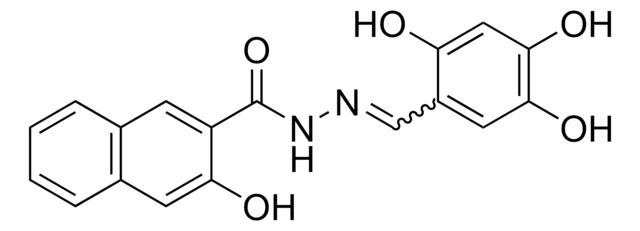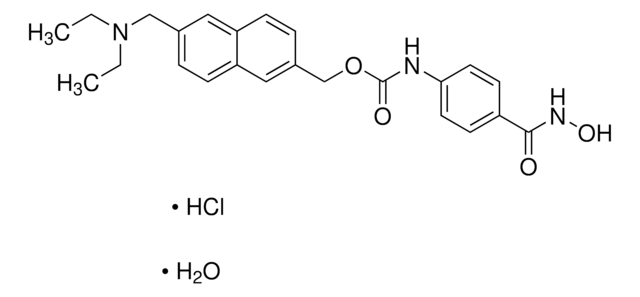Z4152
Zafirlukast
≥98% (HPLC)
Synonym(s):
N-[3-[[2-Methoxy-4-[[[(2-methylphenyl)sulfonyl]amino]carbonyl]phenyl]methyl]-1-methyl-1H-indol-5-yl]carbamic acid cyclopentyl ester
About This Item
Recommended Products
Assay
≥98% (HPLC)
form
solid
solubility
DMSO: ≥28 mg/mL
originator
AstraZeneca
storage temp.
room temp
SMILES string
COc1cc(ccc1Cc2cn(C)c3ccc(NC(=O)OC4CCCC4)cc23)C(=O)NS(=O)(=O)c5ccccc5C
InChI
1S/C31H33N3O6S/c1-20-8-4-7-11-29(20)41(37,38)33-30(35)22-13-12-21(28(17-22)39-3)16-23-19-34(2)27-15-14-24(18-26(23)27)32-31(36)40-25-9-5-6-10-25/h4,7-8,11-15,17-19,25H,5-6,9-10,16H2,1-3H3,(H,32,36)(H,33,35)
InChI key
YEEZWCHGZNKEEK-UHFFFAOYSA-N
Gene Information
human ... CYSLTR1(10800)
Application
Biochem/physiol Actions
Features and Benefits
Hazard Statements
Precautionary Statements
Hazard Classifications
Aquatic Chronic 4
Storage Class Code
11 - Combustible Solids
WGK
WGK 3
Flash Point(F)
Not applicable
Flash Point(C)
Not applicable
Certificates of Analysis (COA)
Search for Certificates of Analysis (COA) by entering the products Lot/Batch Number. Lot and Batch Numbers can be found on a product’s label following the words ‘Lot’ or ‘Batch’.
Already Own This Product?
Find documentation for the products that you have recently purchased in the Document Library.
Customers Also Viewed
Articles
Discover Bioactive Small Molecules for Lipid Signaling Research
Discover Bioactive Small Molecules for Lipid Signaling Research
Discover Bioactive Small Molecules for Lipid Signaling Research
Discover Bioactive Small Molecules for Lipid Signaling Research
Our team of scientists has experience in all areas of research including Life Science, Material Science, Chemical Synthesis, Chromatography, Analytical and many others.
Contact Technical Service









